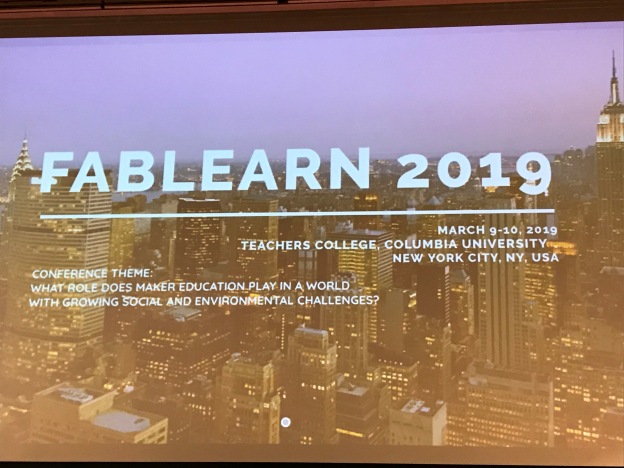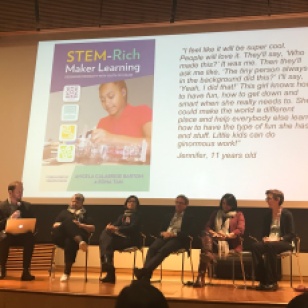The 8th Annual FabLearn flagship conference on Maker Education took place at Columbia University, New York on 9th – 10th March. The conference theme What Role does Maker Education Play in a World with Growing Social and Environmental Challenges attracted over 400 educators, stakeholders and researchers from 23 different countries to participate in inspiring lectures, workshops and poster sessions. From Finland there were three Innokas Network presentations: one poster in Educator track (by Raini Sipilä, Kati Sormunen and Tiina Korhonen), one student poster (by Matias Ola, Sini Riikonen, Tiina Korhonen and Kati Sormunen) and one short paper (by Tiina Korhonen, Laura Salo and Kati Sormunen).
Columbia University is one of the oldest universities in US, established in 1754. It is also a former university of John Dewey whose idea of learning by doing doesn’t get old. During the conference the audience was challenged to ask themselves questions about ‘who is making?’ and ‘why making?’.
Keynote speaker Sylvia Martinez highlighted the word ‘making’ from different angles. Interesting part was her prediction on Future: biotech is the new digital – we will move forward from cyberphysical to cyberbiological future. Martinez also emphasized sharing as the best way to ensure understanding. She encouraged teachers to empower their students to understand their capability to control machines and therefore affect to their own future.
Amanda Cox, the second keynote speaker, came from The New York Times. Cox is a data editor and she is responsible for both written and visual content in NYT. Ms Cox spoke about scale, context, patterns and annotation levels and how these are shown in digital way. In digital newspaper settings are able to create interactively: the reader is able to affect how or what she/he sees and reads. Amanda Cox said, it is important to transform data into a form in which it is more understandable – for example data is put into familiar environment.
Panels on both Saturday and Sunday were more or less representatives’ presentations on their projects. All discussion topics were related with making somehow: Making in an age of social unrest, Making without destroying the planet: is it possible?, Making for film and theatre and Making around the world: Experiences and lessons learned. For me the most fruitful panel was the last one: educators from six different countries shared their experience on maker culture on their own country.
Significantly important notice is, that nobody works alone. Everything is made in collaboration with other people. Short and full papers were written together, young makers and educators had worked with teams to get their presentations to the conference. My visit with Innokas Network experts was amazing. My mind and understanding grew because of the conversations I had with all kinds of people. People who seemed to be as interested in making and designing as I am.

Raini Sipilä





